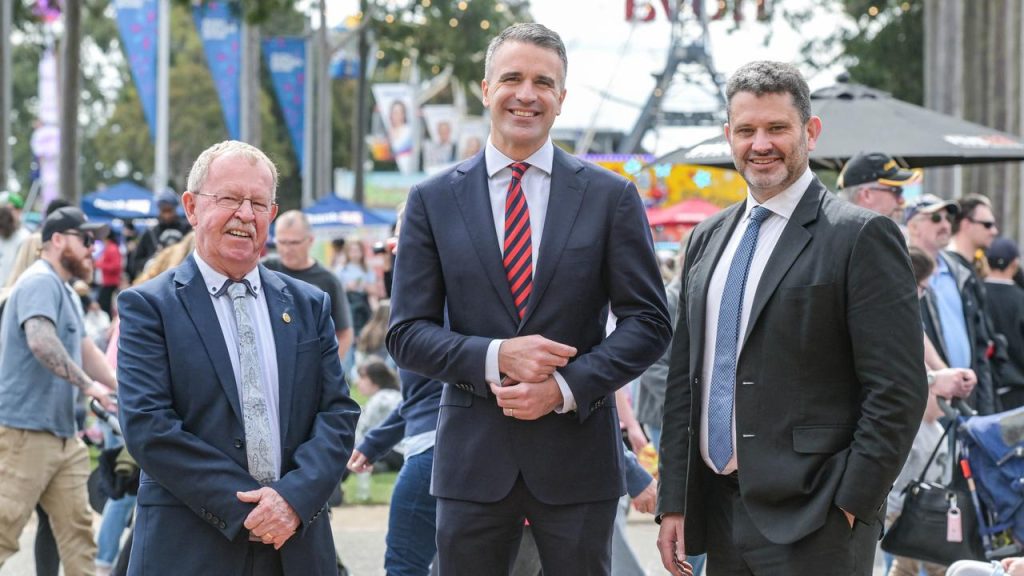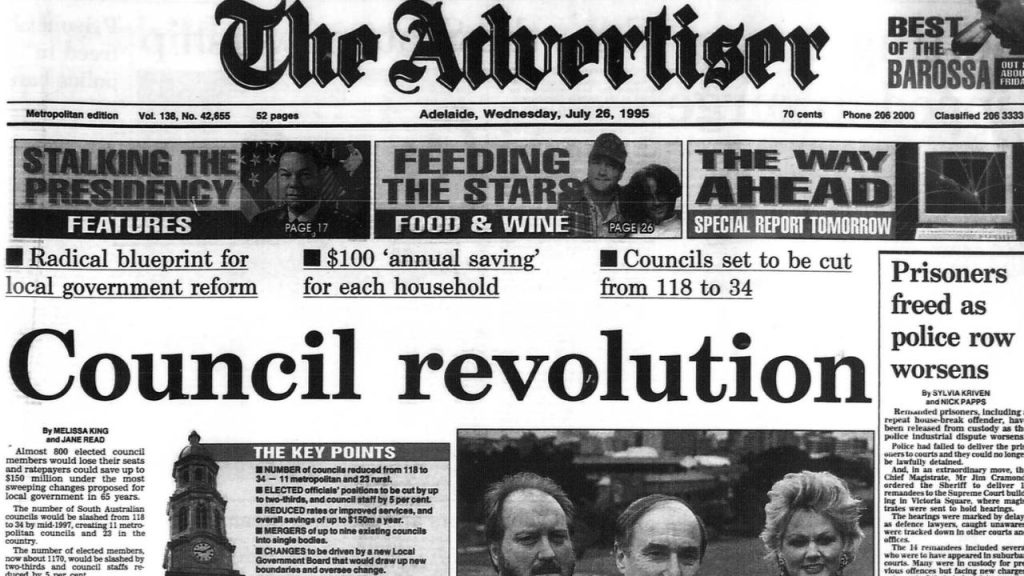Power blocs, not people, have always controlled Councils
What about a power bloc controlled by the people?
Ever since I nominated for Mayor and 11 others nominated for the 12 positions open for Councillor in the Onkaparinga Council Elections from September 2022 a common complaint has been that 12 people teaming up to bring in some reforms would be some sort of affront to democracy.
Should anyone be surprised when people object to a ‘power bloc’ trying to enter council to ‘dictate’ their wishes yet are totally ok with the Labor party moving in? No; our conditioning has led us to believe a power bloc led by the big political parties are ok or not really power blocs at all.
What is the Labor or Liberal party other than a ‘power bloc’ that stifles free debate. If anyone thinks they have free reign to debate and form their own opinions in any political party they are sadly mistaken. And so debate is also strictly controlled in councils today.
In the mid 1990’s the number of councils was slashed from 118 to 68 and then on 6 September 2022 the Premier, Peter Malinauskas, announced that the City of Mount Gambier and the District Council of Grant should be considered for amalgamation.
Asked by the Advertiser about this in an article, ‘Telfer slams Malinauskas merger blueprint’ he said,
If this model were to result successfully in a council amalgamation voted for (by) a community and its people, then we would see it as potentially being a model for utilisation elsewhere.

Local Government Minister Geoff Brock with Premier Peter Malinauskas and Attorney-General Kyam Maher after a cabinet meeting on 5/9/2022 approved a model for the amalgamation.
Picture: Brenton Edwards of the Advertiser
The Local Government Association of SA, on their website on a section on ‘Supporting new boundary reform processes’ has stated;
The state government must commit adequate resources for the Local Government Grants Commission to progress this work (of amalgamations and boundary realignments), as a priority, in consultation with councils and communities.
Who could possibly be happy with any reduced number of councils?
Although government has always believed that bigger is cheaper the experience for the average person has been the opposite.
Bigger councils mean bigger bureaucracies and the bigger dollars for more projects, within a council’s widening sphere of control, will create bigger opportunities for ‘jobs for the boys’ and the smaller number of elected members from amalgamations will mean less representation of rate payers.
Will councils become a surrogate for the government with the end of debate as we know it, as the remaining elected members have more pressure placed upon them to tow the party line?
Will rate payers become a bigger cash cow than they are already?
The Advertiser’s Paul Starick, in the same article of 6/9/2022 commenting on the 68 councils in South Australia said;
There is a strong case for halving that number to 34 – as recommended 27 years ago by a ministerial advisory group

The Advertiser front page of 26/7/1995 signalled a big move to reduce the number of councils
from 118 to 34
Local government is the place where much of the government’s controversial agenda first takes hold because in councils they don’t have to contend with an upper & lower house or all the checks and balances that exist in state and federal government.
In a council like Onkaparinga with 12 Councillors & a Mayor only 7 votes are required to push something through. With a quorum of 7 that means as few as 4 votes are required to bring in something like the requirement to submit to facial recognition to access government services.
Did you know the Governor may, by proclamation, amalgamate or abolish any council? Even though the government realises they have to play the consultation game, in the end, no votes are needed from Councillors to agree to amalgamation for abolition.
Furthermore all of the assets can go to the Crown, not the rate payers who paid for them. See the Local Government Act 1999, Section 9(j), 10 (8) & (9).
We decided to campaign in the Council elections, in part, because of these threats of amalgamations. We started just 3 months before the count was to happen on 10 November. We didn’t even find our last candidate until 3 September. None of us had ever done anything like this before.
So we went from a zero following in Onkaparinga which has 176,000 people in about 62,000 homes, to getting one candidate across the line and me only missing out by 280 votes, mostly by knocking on thousands of doors and talking to people face to face. We had about 80 people who assisted us for no other reason than because they got inspired.
We made a map of the whole of Onkaparinga made out of pages from the UBD Street Directory enlarged 141%. It’s just over 2.7m long and we marked out in bright yellow all the streets as we visited them. If we missed your street I could probably pin point it on the map where the yellow may have missed you.
I might have personally spoken to about 800 people and I could number on 1 hand how many people expressed any sort of negative view on what we were doing.
So the government conducted the election in Onkaparinga. They printed, delivered and counted the ballots and their preferred candidate got in. That’s entirely possible but due to violations of the requirements for running an election we may never know the truth of the result.
Do the words, ‘conflict of interest’ come to mind?
Who truly trusts government anymore?
People have suggested that having our group in place would mean the end of debate. That would only be true for the core of our key principles.
We weren’t going to sell off the water assets but we were definitely going to reduce spending, cut new loans and commission a full forensic audit of finances with a view to slashing waste and reducing rates and we were going to stop the forced sale of the homes of rate payers, who were in financial need, who were behind in their payments.
But beyond the basic 21 points of our Action Plan debate was free and open.
Yes, we didn’t think those 21 points were up for debate between us, because we had already debated and agreed upon them.
Which of those 21 points to you disagree with?
You can bet your bottom dollar there won’t be too many open debates in council on our 21 points.
Are you content with your rates rising?
Are you ok with the forced sale of homes of rate payers in financial trouble who are in arrears?
I can just about guarantee the current council will support all the things we are against because they have to, not because they are bad people.
Elected members are transient, temporary and highly open to manipulation. They are a burden and an annoyance to the orderly business of the bureaucracy of local government who believe they are the ones in charge.
In the opinion of the upper echelons of local government and their masters in state government, elections are a necessary evil which must be tolerated and controlled.
If they can’t control the outcome of elections they have the means to control elected members.
The Council have teams of lawyers formally tasked to school elected members in how to discharge their duties in accordance with the ‘LGA Training Standards for Council Members’.
When upstart members ask too many questions there are numerous ways to have them censored, threatened, harassed, brow-beaten, crushed or just ignored. The various weapons at the disposal of these lawyers including charges of bullying against other Councillors or council staff, conflict of interest or charges of releasing documents that are ‘Confidential’ or which they should have reasonably known were ‘Confidential’.
Dividing members against each other or convincing members to gang up on that new member who asks questions are powerful tools.
If lawyers can convince some members to issue restraining orders against a ‘disruptive’ member, even where no formal complaints have been lodged, that legally prevents the ‘disruptive’ member from speaking out.
It’s all about muzzling dissent and stopping the actions they don’t want.
Long lectures from these lawyers to newly elected members constantly remind them that Councillors have gone to prison before and will again in the future, for stepping out of line. They are reminded that the long arm of the law will go after them even after they leave office as is happening now to some, even as we speak.
The fact remains that any single Councillor hoping to bring about change is going in as a sheep among wolfs.
The only hope is to have a team who are prepared to stick together to do what is necessary to bring about structural change. A team who have life experience and common sense, just average mums & dads with no ties to special interests, who know what average people want & expect but who are willing to keep the institutions and bureaucracy of government accountable to the will of the people.
If you don’t agree that ordinary people are capable of knowing what few core issues are good for themselves and their neighbours then you may well need to re-examine your own ideas more closely.